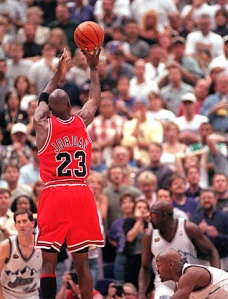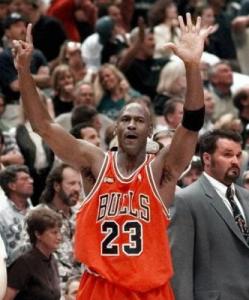Is Michael Jordan the best ever? The vast majority of the experts seem to think so. Everyone from Bob Ryan to Larry Bird to Kobe Bryant has called him the greatest. Coaches, GMs, announcers, sportswriters, and players agree. But do the numbers agree? Let’s see what Mike’s got going for him.
Metrics:
Win Share – 4th All Time, Led the league 9 times
PER – Highest Career Average, Led League 7 times
PAWS – Far and away the best for any shooting guard
Statistical Plus/Minus – Highest Career Average
GameScore – Highest Recorded
Traditional Stats:
Scoring – Highest Career Average, 10 Times Led League, 3rd Most Total Points, 3rd Most Points in a Single Season
Steals – 3 Times Led League, 2nd Most Total Steals
Blocks – Most Total Blocks by a Guard
I’m not going to list MJ’s career totals and averages because you should all know them as well as I do, but here they are if you’d like a refresher. What do these metrics and statistics tell us? Well it depends on how much you value scoring. If you think scoring points matters, and you believe sustained excellence is the definition of greatness, then he’s pretty much the greatest. I’m actually a little more impressed by the metrics. Each metric measures unique qualities, and he is at the top of the all of them. Even in total Win Shares, where he isn’t ranked number one, he has the best per game or per minute averages and only trails Kareem, Karl, and John due to a deficit in total games played. By no means would I call that conclusive evidence that Jordan is the best ever, but it provides a level of relatively objective support for the argument.
That said, where MJ really separated himself from his contemporaries and even his historical rivals such as Chamberlain and Oscar was in the playoffs.

Steal, shove, and shoot. The three Ss of playoff glory.
Playoff Metrics:
Win Share – Highest Career Total, 7 Times League Leader
PER – Highest Career Average, 6 Times Led League
Playoff Stats:
Scoring – Highest Career Average, 10 Times Led League (per game), Most Total Points, Most Points in a Game
Steals – 2nd Most Total Steals, 2 Times Led League
Blocks – Most Total Blocks by a Guard
I find these numbers much more impressive than the regular season lists. He has a higher point total and a higher total Win Share than Kareem, even though Kareem played 58 more games. In fact the closest active player to Jordan in both categories is Shaq, who trails by a staggering 866 points and 7.6 Win Shares, despite having already surpassed Michael by 24 in total playoff games. Also impressive is his dominance in PER and points per game. Consider that this includes Jordan’s entire career up to age 35. You would think that some active player in his prime, whose production had not yet begun to deteriorate due to age, would have an advantage here.
Again we see statistics that support the idea that Michael is a serious candidate for best ever consideration. But I always tell people that the stats show you what a player did, but not how he did it. It’s crucial to know how all those points were accrued, why he was so efficient as a perimeter scorer, what changed in his game to help his teams become successful.
Jordan was the premiere slashing scorer of all time. He had a monstrously explosive first step, fantastic ball control with enormous, strong hands, and dazzling finishing skills. He was also one of the very best high post scorers ever and a great jump-shooter. His three point shooting is sometimes cited as a weakness, but even this chink in the armor is overrated. Jordan shot at least 35% from 3 every season he averaged at least 2 three point field goal attempts per game. In games when he attempted 3 or more three pointers, he shot 38% from beyond the arc. Like most players including Bryant and Bird, higher volume led to better shooting, and he certainly used the three effectively when necessary and he still holds the record for most three pointers made in a half of an NBA Finals game.
Michael’s role on the Bulls changed dramatically over the years. In his youth, he was asked to do pretty much everything. He led the team in assists most seasons, and he played a leading scorer point guard role not unlike what Wade and LeBron have done the past few years. When Phil Jackson took over as head coach and moved Pippen into the point forward position, Michael moved off the ball. He retained significant playmaking duties before his first retirement, but his ability to play without the ball allowed Scottie to maximize his talents and helped to keep the rest of the team involved and motivated. Mr. Jackson apparently knew what he was about. When Jordan came back from retirement he switched from being an occasional post-up guard to a nearly full-time post-up guard. Instead of opening up angles for cutting bigs and perimeter shooters by attacking with the dribble, he drew the defense off balance by taking his defender into the post and creating slashing opportunities for his teammates. The play style, while still utilizing the triangle, was tremendously different, and Jordan’s versatility helped to make it possible.
Defensively Jordan has an argument as the best guard ever. He is the only player to ever average 3 steals and a block in the same season. He’s one of the few guards with a defensive player of the year award to his name, and he made 9 All-Defense first teams. He was also lock down on the perimeter and often asked to switch onto the quicker point guards such as Kevin Johnson, Tim Hardaway, and Isiah Thomas when Paxson needed help. In the first three peat defense he was asked to trap and recover a lot like LeBron does for Cleveland right now. In the second three-peat defense, there wasn’t much trapping, but there was a ton of switching on the perimeter, and Michael, Pippen, and Harper would take over for each other on both guards and small forwards without discrimination.

6 Rings in 8 Years
As an end to this rambling post, I’d like to add a quote from Steve Kerr. People like to talk about players who make their teammates better. A good point guard like Steve Nash or Magic Johnson is often credited with making his teammates better because they know how or when to pass to players to get them shots they are able to hit. Shaquille O’Neal could get his teammates open by drawing double teams. Tim Duncan made it easier for his teammates to defend by giving them a shotblocker to funnel slashers into. All of those are great attributes, and Jordan did a little of each of those things, but he didn’t just make the game easier for his teammates. He didn’t just simplify things at both ends and allow role players to operate comfortably within their roles. He trained them to handle pressure and play with confidence.
Here’s what Steve Kerr had to say in an interview about the 71 win 1996 Bulls:
Right from the beginning of training camp he kind of set the tone with his intensity. That whole month of camp was just incredible. Fights were breaking out. Every drill, every game, every scrimmage was just a complete battle. That set the tone for the competitive nature of that team and Michael was responsible for that.
Michael had put so much pressure on us all year that whatever we faced in the playoffs wasn’t going to bother us. Every practice through all year just continued the intensity, and when you have Michael you pretty much think you’re going to win every game. So he took so much of the pressure off just by being himself.
November 9, 2009 at 10:41 am |
simply the greatest i’ve ever witnessed play the game, and i’ll give anything to be like mike…….
November 9, 2009 at 7:22 pm |
you are not alone in that opinion, ryan.
February 17, 2013 at 9:55 pm |
[…] https://doubledribble.wordpress.com/2009/09/11/michael-jordan-statistically-speaking/ […]